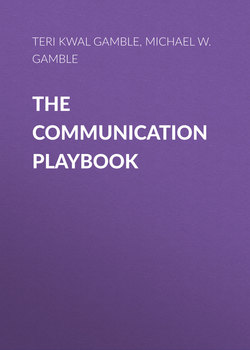Читать книгу The Communication Playbook - Teri Kwal Gamble - Страница 169
На сайте Литреса книга снята с продажи.
Commit to self-growth.
ОглавлениеAs you move from yesterday through today and into tomorrow, your self is in constant transition. Try not to let your view of yourself today prevent you from adapting to meet the demands of changing circumstances and conditions. Uncover the vibrant, flexible, and dynamic qualities of you.
Thought is the talk which the soul has with itself.
Plato
Complete This Chapter 3 Checklist
3.1 I can define and explain the process of perception. □Perception is the process of selecting, organizing, subjectively interpreting, remembering, and responding to sensory data in a way that enables us to make sense of ourselves and our world.
3.2 I can describe the nature of self-concept. □Self-concept is the entire collection of attitudes and beliefs you hold about who you are. It is the mental picture you have of yourself. Self-concept, which influences all aspects of behavior, can be positive or negative, accurate or inaccurate. You are not born with a self-concept. Rather, it is shaped by your environment and those around you.
3.3 I can describe the various ways self-concept affects behavior. □Based on our self-concept, we ascribe reasons for behavior. Excessive self-esteem can lead to unrealistically high self-appraisals and problematic behavior, but people with normally high self-esteem tend to be happier and less influenced by their peers.
3.4 I can describe the factors affecting self-concept and outlook. □We become different selves as we move from one set of conditions to another. Resilience and grit, self-understanding, and expectations (including self-fulfilling prophecies) affect our self-concept and outlook.
3.5 I can explain how to use life scripts, the Johari window, and impression management to develop self-awareness. □Self-concept changes and improves with self-awareness. Understanding the life scripts you employ that lead to success or failure and using the Johari window can facilitate improved self-concept. The Johari window helps to identify the open, blind, hidden, and unknown areas of yourself. When we create a positive image of ourselves to influence what others think of us and how they perceive us, we are practicing impression management.
3.6 I can identify common perceptual barriers. □By becoming aware of your role in perception, by recognizing that you have biases, and acknowledging the limiting effects of first impressions and stereotypes, you can increase perceptual accuracy. Perception also is improved by not taking perceptual shortcuts, including being careful not to stereotype others in ways that promote prejudice and prevent you from seeing the uniqueness in every individual. Also of import is that we not act with too much certainty or too quickly, not think we know it all, not place unnecessary restrictions on problem solving, and not make unjustified inferences. On the other hand, being able to empathize increases our capacity to perceive accurately.
3.7 I can explain how gender affects perceptions of me and others. □Gender preferences contribute to our adopting different standpoints, perceiving different realities, and having different expectations set for us. They also lead to our exhibiting different communication behaviors.
3.8 I can explain how culture affects perceptions of me and others. □We view reality through a cultural lens that biases us toward our own culture. This can precipitate cultural nearsightedness and serve as a barrier to self–other understanding.
3.9 I can analyze how media and technology influence perceptions of me and others. □According to critics, we learn the stereotypes and skewed images of reality that media, including social media, present to us. Digital and social media raise a host of perception-based issues about the nature of our identity and our ability to identify what is truthful.
3.10 I can use communication skills to improve the accuracy of self-perception, perception of others, and perception of events. □We increase our perceptual abilities when we recognize that perceptual processes are personally based, take the time we need to process information about ourselves, others, and events fairly and objectively; and try to become more open to change. By watching ourselves in action, learning how others perceive us, and committing to self-growth, we improve our self-awareness.
